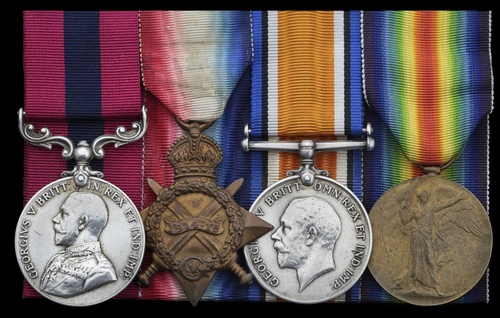
Auction: 22002 - Orders, Decorations and Medals
Lot: 209
A 'Paive River 1918' D.C.M. group of four awarded to Lance-Serjeant W. Ireson, 11th Battalion, West Yorkshire Regiment, who single-handedly accounted for seven enemy machine guns between 27-29 October and - despite being seriously wounded - refused to leave the line until ordered to do so
Distinguished Conduct Medal, G.V.R. (14001 L.Sjt W. Ireson 11/W. York. R.); 1914-15 Star (14001 Pte W. Ireson. W. York: R.); British War and Victory Medals (14001 Cpl. W. Ireson. W. York. R.), polishing, minor contact marks, slight edge bruising, overall nearly very fine (4)
D.C.M. London Gazette 26 February 1920, the original citation states:
'Throughout the operations on the Piave on 27th, 28th and 29th October, 1918 he displayed most conspicuous gallantry and dash. On the 27th, with one other man, he worked his way along the Bund, and at close quarters captured three machine guns and their crews. On the 29th, after the Monticano was crossed, he captured single-handed four machine guns and crews, and, after being badly wounded, refused to leave the line until ordered to do so.'
William Ireson was born at Thurgarton, Nottinghamshire on 16 March 1886, the son of Samuel and Elizabeth Ireson of Thurgarton. Working as an Insurance Agent prior to the war, Ireson married Florance Holt at St. Peter's Church in Barnsley on 16 October 1909. Entering the war in France on 26 August 1915 with the rank of Private he was promoted Corporal at some stage before 1918 and faced heavy fighting at Loos - and later Contalmaison and Le Sars. Transferred to Italy in 1918 Ireson was promoted Lance-Sergeant.
Hospitalised with influenza in June 1918 Ireson was taken to No. 39 Casualty Clearing Station. Discharged to 70 Field Ambulance on 15 June, Ireson was lucky to survive the illness and return to his Battalion. The Offensive was planned for 27th October and the 11th Battalion began their attack at that point. The fighting was extremely heavy over three consecutive days of attacks but they managed to take every objective given to them. The Battalion war diary for 29 October provides details of the attack, stating:
'Attack proceeded according to plan, and a great number of prisoners were captured also Machine Guns. Objectives were gained before night time Later in the evening our line was withdrawn a little to conform with the flanks. H.Q. were [SIC] established at C.Balla. An enemy counter attack appeared imminent just after dusk, but did not develop.'
The capture of large numbers of enemy machine guns was a theme for the attack and Ireson no doubt contributed heavily to this. Recovering from his wound he was discharged to the 'Z' Class Reserve on 27 January 1919. Returning to Barnsley he soon moved to Worsbrough - were he had originally enlisted - for work as a Coal Hewer. Ireson died at Bradford in July 1957; sold together with copied research including medal rolls, M.I.C. and army lists as welll as extracts from the London Gazette, Battalion War Diary and The West Yorkshire Regiment in the War.
Subject to 20% VAT on Buyer’s Premium. For more information please view Terms and Conditions for Buyers.
Sold for
£1,200
Starting price
£400




